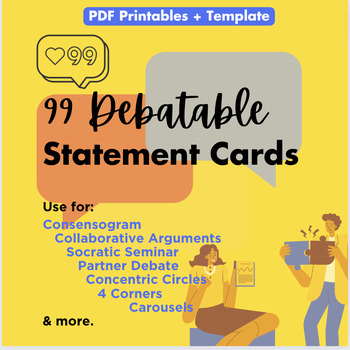99 Debatable Statement Cards - Printables, Argument Writing, Discussion, Debate
- Google Drive™ folder

Also included in
- This "Ultimate Debate Bundle" is everything you need to facilitate clear, well-organized debates for students of elementary school - 12th grade. The materials are designed for a students of varying language and learning needs, fitting the language development needs of ESL students as well as studentPrice $20.65Original Price $29.50Save $8.85
Description
Looking for an engaging tool for debate, argument writing, consensus building, and discussions? These 99 Debatable Statement/ Claim cards are the perfect way to spark lively engagement in your classroom. These debatable statements go beyond the basic and include claims that push students to think critically, yielding high cognitive demand. I have cultivated and created these 99 Debatable Statements after years of teaching AP Language and debate. These are inciting claims that will ignite discussion and push students to dig deep into topics and concepts. Even better -- these cards are fantastic for "No prep" circles or discussions. I've used the cards to introduce argument in AP Language followed by repeated daily and then weekly generative thinking and collaborative argument exercises. I've also used the 99 Debatable Statement cards with 9th-12th grade students to kick-off a unit's themes in a discussion and Consensogram by choosing cards specific to our unit /text's themes.
The 99 debatable statements relate to universal ideas and themes that can be connected to almost any text. Here are some of the universal ideas represented in these statements:
- Love, friendship, family, freedom, safety, vulnerability, "good," "evil," jealousy, loyalty, culture, identity, change, happiness, justice, injustice, morality, values, wealth, reputation...
What are some examples of the statements?
- It is each individual’s own fault if someone deceives them.
- We can’t change who we truly are deep down-- no matter how hard we try. We are who we are.
- Love will not find you, you have to find love.
- Once a reputation is ruined, it can never be restored.
Note: I designed these cards because I wanted more than claims that resemble something like, "Pineapple should be a pizza topping." There is a time and place and purpose for "pineapple topping" claims, but I wanted to cultivate a list of claims that pushed the demand and critical thinking. I also find that more demanding claims that require critical thinking yield stronger discussions.
What's included in this resource?
- I love to print in color and laminate these cards, but I know that's not always possible. I've included the 99 cards as a black and white PDF version as well as a color PDF version. Each version is numbered on the back (need to print double-sided) and the cut-out shapes are outlined lined on the reverse backside, so it's easy to see where to cut. Each version contains 9 cut-out cards. The card shape is made to resemble a polaroid picture frame.
- I've also included the template in case you want to make more cards of your own using this shape in the form of Google Slides. These template slides are in color and black and white. All you have to do is make a copy of the slides for yourself, then, make a copy of the template slide you want to work with (color or black and white). Finally, type in your text in the text box inside each frame. The Google Slide card template also includes a reverse side for numbers - or anything else you want to add to personalize it for your students.
How Can I Use the 99 Debatable Statement Cards?:
- Literally anytime throughout the year - I laminate and print in color to save for long lasting use. These cards can serve as the centerpiece of the lesson or an add-on extension.
- There are countless nights and weekends that I stayed up searching for the "Just right" statements that would engage and spark discussion and debate. This resource provides a carefully cultivated and created list of statements that will work in many lessons.
Here are some ways I've implemented these cards:
- Anticipation Guides to kick off a unit or book
- Partner Debate
- Whole-class debate
- Socratic Seminar
- Concentric Circles
- Give one-get one convos
- Speed Dating Convos
- Generative Thinking
- Consensus Building
- Carousels
- Collaborative Arguments
- Small group discussion
- Journal writing
- Do Now's/Bell Ringers
- Evidence hunt - find evidence to support a stance in response to the card statements.
- When you have 5-10 minutes left in a lesson ... grab these!
- When I need something quick and want it to be meaningful and engaging, but haven't planned!
Check out the preview for this listing to see some of the cards!
I hope you and your students enjoy working with the 99 Debatable Statement Cards as much as my students do!
Earn free TPT Credit!! Offer feedback by:
- Going to your "My Purchases" page to find the "Provide Feedback" button next to each purchase. Follow the link to offer a rating and leave a comment for the product.
- Each time you give Feedback, TPT awards you credit that you can use to lower the cost of future purchases.
- I value your feedback. I am continually improving and developing new resources based on feedback from the TPT community. Thank you!
Follow me by clicking the GREEN Star under my store name. Be the first to know about new products and promotions.
Follow on Instagram
Check out my blog with teaching strategies
Check out these discourse resources to level up engagement in your classroom:
- Probing Questions Speed Dating
- Discourse Builder Discussion Roundtable / Close Reading Activity
- Questions Stems by Question Type One-pager
- Progressive Questioning PD Workshop
Check out these resources to engage students in Debate:
- Freedom v. Safety Debate
- Growth Mindset Debate
- Who Gets the Heart Debate
- Debate Template/Slides for In-person & Digital Debates
- Full Debate Bundle Adaptable for all levels/grades + ESL
Check out these Argument Writing Resources:
- AP Language Argument Essay Step-by-Step Writing Guide
- Rhetorical Claims & Appeals Bundle
- Argument Essay Slides
- Ethos, Pathos, Logos Slides
- AP Language Exam Overview & Study Guide with Links
- Argumentative Writing Folder
- Argument Writing Stems Handout with Counter-rebuttals
- “Unknown” AP Lang Argument Prompt Essay Organizer Kit
- “Overrated AP Lang Argument Prompt Essay Organizer Kit + Line of Reasoning
Check out these listings to boost your students’ engagement with Rhetorical Analysis
Read Like a Writer - Rhetorical Analysis Kit
AP Lang Rhetorical Analysis Essay Reflection Tool
Rhetorical Device BIG Slide Deck
Rhetorical Claims & Appeals Bundle
Preparing your students for AP / SAT Multiple Choice Exams? Drive home strategies through these resources that get students ENGAGED with test preparation.
- Multiple Choice READING Questions Video Guide + Scaffolded Notes
- Multiple Choice WRITING Questions Video Guide + Scaffolded Notes
- AP Lang Multiple Choice EXPERT LESSON Group Activity
- Multiple Choice WRITING Slides: Sentence Combining & Organization Questions
- Multiple Choice Strategies POWERPOINT - AP/SAT/PSAT/MCAS all subjects
- AP Lang Multiple Choice WRITING questions with VIDEO tutorials
- Multiple Choice READING questions GROUP SOLVE activity (AP Lang/SAT/PSAT)
- Multiple Choice Strategy Mini Cards
Follow my TPT store for sales & new products. Thank you for leaving a review!






